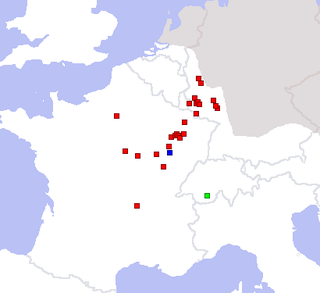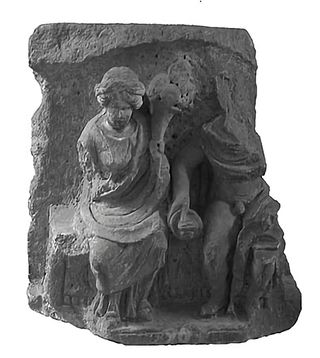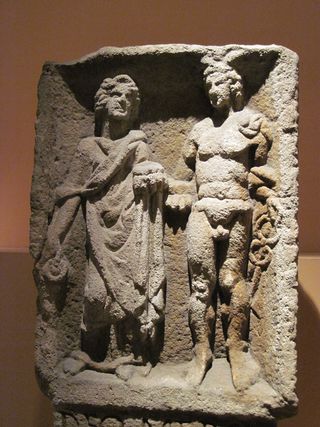ロスメルタ
ガロ・ローマ時代の宗教では、ロスメルタ(Rosmerta)は豊穣と豊穣の女神であり、その属性はコルヌコピアなどの豊穣のものであった。ロスメルタは、彫像や碑文によって存在を証明されている。ガリアでは、彼女はローマの神メルクリウスとともに描かれることが多かったが、単独で描かれることもある。
語源
ロスメルタという名前はガリア語で、ro-smert-aと分析される。Smertは「提供者」「世話役」を意味し、Ad-smerio, Smertu-litani, Smerius (Σμερο), Smertae, Smertusなど、ガリア人の名前にも見られる[1]。Ro-はRo-bili(「最も良い」)やRo-cabalus(「偉大な馬」)に見られるように、「非常に」「偉大な」「最も」という意味の修飾語である[2]。語尾の-aは典型的なガリア語の女性単数主格である。つまり、「偉大なる供給者」という意味である。
図像
オータン(古代ケルト人の首都アウグストドゥヌム[3])のレリーフには、ロスメルタとメルクリウスがカップルとして一緒に座っている様子が描かれている。ロスメルタはコルヌコピアを持ち、その左側にはパテラを持ったメルクリウスがいる。
アイゼンベルクの浅浮彫り[4]には、同じように相対的な位置にいるカップルが描かれており、碑文によってロスメルタが明確に特定されている[5]。
A bas-relief from Eisenberg shows the couple in the same relative positions, with Rosmerta securely identified by the inscription. Rosmerta holds a purse in her right hand and a patera in her left.
In a pair of statues from Paris depicting the couple, Rosmerta holds a cornucopia and a basket of fruits.
Rosmerta is shown by herself on a bronze statue from Fins d'Annency (Haute-Savoie), where she sits on a rock holding a purse and, unusually, also bears the wings of Mercury on her head. A stone bas-relief from Escolives-Sainte-Camilleテンプレート:Sfnp shows her holding both a patera and a cornucopia.
Inscriptions
Twenty-seven inscriptions to Rosmerta are listed by Jufer and Luginbühl,テンプレート:Sfnp distributed in France, Germany and Luxembourg, corresponding mainly to the Roman provinces of Gallia Belgica and Germania Superior. An additional two inscriptions are known, one from Roman Dacia.[6]
An inscription from Metz[7] is a dedication (votum) to Mercury and Rosmerta jointly. Another from Eisenberg was made by a decurion in fulfillment of a vow to the couple jointly.[8]
In two inscriptions[9] both from Gallia Belgica, Rosmerta is given the epithet sacra, sacred. A lengthier inscription from Wasserbillig in Gallia Belgica[10] associates the divine couple with the dedication of a shrine (aedes), with "hospitable" rites to be celebrated.[11]
See also
References
- Année Epigraphique volumes 1967, 1987, 1998
- Corpus Inscriptionum Latinarum (CIL), volume 13, Tres Galliae ("The Three Gauls")
- テンプレート:Cite book
- テンプレート:Cite book
- テンプレート:Cite book
参照
- ↑ Delamarre, 2003, page277
- ↑ Delamarre, 2003, pages261–262
- ↑ 現在のフランスの都市
- ↑ Deyts, 1992, page119
- ↑ AE, 1905, 58
- ↑ テンプレート:AE
- ↑ テンプレート:CIL
- ↑ Deo Mercu(rio) / et Rosmer(tae) / M(arcus) Adiuto/rius Mem/{m}or d(ecurio) c(ivitatis) St() / [po]s(uit) l(ibens) m(erito) ("Marcus Adiutorius Memor, a decurion of the civitas St… has deposited [this votive] willingly, as is deserved"). The name of the civitas, the Celtic community, is presumably obscured. The latter phrase is a variation on the standard votum solvit libens merito, in which the person making the dedication declares that he "has released his vow willingly, as is deserved," often abbreviated as V.S.L.M.
- ↑ テンプレート:CIL and テンプレート:CIL.
- ↑ テンプレート:CIL
- ↑ Deo Mercurio [et deae Ros]/mertae aedem c[um signis orna]/mentisque omn[ibus fecit] / Acceptus tabul[arius VIvir] / Augustal[is donavit?] / item hospitalia [sacror(um) cele]/brandorum gr[atia pro se libe]/risque suis ded[icavit 3] / Iulias Lupo [et Maximo co(n)s(ulibus)].


